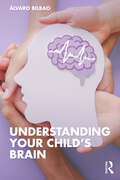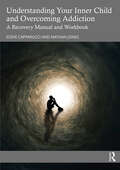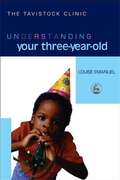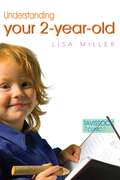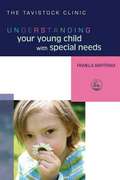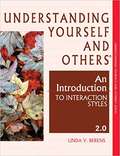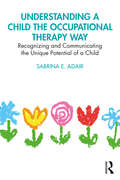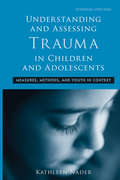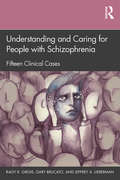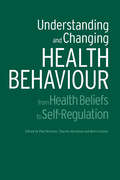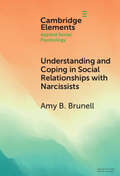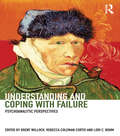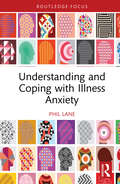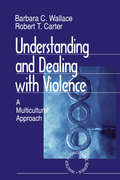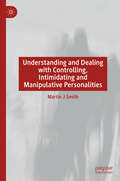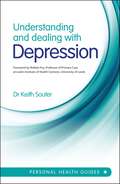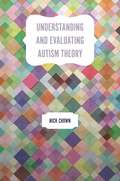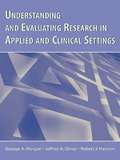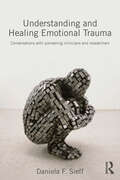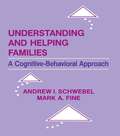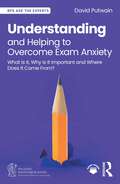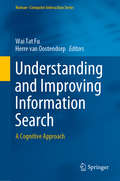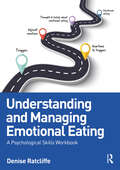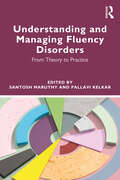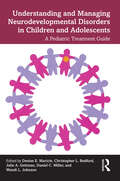- Table View
- List View
Understanding Your Child's Brain
by Álvaro BilbaoUnderstanding Your Child's Brain simplifies the neuroscience behind what is going on in a child’s brain during the first six years of life to help parents develop the full intellectual and emotional potential of their children. The book starts with an accessible explanation of the pillars and principals to understanding the child’s brain. It then provides tools to helps parents communicate more effectively with, nurture empathy in, and enforce rules and positive behaviours for their children. Examining how to develop the emotional intelligence of children as well as their intellect, the chapters examine how to raise children based on trust, assertiveness, and fearlessness, while also providing support and exercises in improving language, memory, creativity, and self-control. This book offers parents and educators practical solutions to parenting problems and realistic advice for ensuring the healthy emotional and intellectual development of their children. It will also be relevant to all mental health professionals who want to be more assertive when talking to parents about their child’s problems and growth.
Understanding Your Inner Child and Overcoming Addiction: A Recovery Manual and Workbook
by Nathan Jones Eddie CapparucciThis book provides a comprehensive overview of the Inner Child Model™ for treating Addictive Behaviors, a trauma-based approach to the treatment of various addictions including alcohol, drugs, food, gambling, sex, spending, smoking, etc. Research indicates the onset of addiction originates in childhood trauma, inability to process emotional discomfort, and attachment disorders. This book addresses each of these issues to assist individuals in overcoming the drivers of addictive behaviors. But more importantly, provides solutions to help those who struggle to learn to manage their addiction. It contains numerous case studies in which readers will see themselves and their stories throughout the pages and assists readers in generating a comprehensive recovery roadmap that will provide real-world solutions to staying one step ahead of their addiction. While there have been books written about the Inner Child, few focus on how the Inner Child impacts addiction. This unique and interactive therapeutic approach empowers individuals by assisting them in understanding "why" they engage in addictive behaviors. This book is written for anyone struggling with behavioral/substance addiction, their loved ones, and clinicians working in the field of addiction treatment.
Understanding Your Three-Year-Old
by Louise EmanuelWhat changes when a young child begins to leave toddlerhood behind? How do you keep track of your child's good and bad experiences at nursery and kindergarten and support her through them? What is the best way to cope with temper tantrums, and why do they happen? Louise Emanuel presents practical tips and a great deal of emotional reassurance for both the first-time and the experienced parent. She offers helpful guidance on a range of topics, from managing sibling rivalry and ensuring everyone in the family gets a good night's sleep, to encouraging conversation and imaginative solitary and social play.
Understanding Your Two-Year-Old
by Lisa MillerWhat makes children in their 'terrible twos' behave as they do? How can parents decide when their child is ready for day care, and manage their child's transition to a trusted child minder? Lisa Miller guides parents through their two-year-old's development, from how to deal with a 'bossy boots' to understanding the central importance of toys, and the development of language and nonverbal communicative skills. She describes ways in which parents can help a young child express or resolve difficult feelings or jealousy, come to accept and welcome a new-born sibling, and negotiate friendships.
Understanding Your Young Child With Special Needs
by Pamela BartramParenting children is always a challenging process, and parenting a young child with special needs presents extra challenges. This book offers an insight into how disability impacts on the normal stages of child development during the first five years. Placing the child and his or her personality, family life, feelings and behaviours at the centre of the book, Bartram addresses all the 'ordinary' challenges and tasks of parenting, such as sibling relationships, nursery and school, toilet training, and healthy aggression, as well as those that are of particular relevance to the parents of young children with special needs. This accessible book provides a wealth of information to help the parent of a young child with special needs, and is also of interest to professionals working with babies and pre-school children with special needs. Book jacket.
Understanding Yourself and Others: An Introduction to Interaction Styles 2.0
by Linda V. BerensUnderstanding Yourself and Others: An Introduction to Interaction Styles reveals the four fundamental interaction style patterns for you to "try on" in your search for understanding yourself (and others). Within these patterns are clues to the "how" of our behaviors. Find out how you consistently see to fall into certain roles in your interactions with others and how you can shift your energies to take on other roles when necessary. <P><P> After seven years of working with this groundbreaking model, Linda Berens has completed version 2.0. She added two additional pages for each Interaction Style with expanded arrow pattern descriptions AND snapshots of four variations for each style. In addition, there is a new page devoted to the four energy patterns and the four decision-making styles. <P><P> A conceptual change was made in the Things-in-Common section to help people clarify their Interaction Style. The focus on Control versus Movement was changed to a more bias free dichotomy of focus on Outcome versus focus on Process.
Understanding a Child the Occupational Therapy Way: Recognizing and Communicating the Unique Potential of a Child
by Sabrina E. AdairThis book uses an occupational therapy way of thinking to guide the reader towards observing, understanding, and communicating the needs of children to foster a supportive environment. Presented in accessible, everyday language, this book takes a holistic approach of looking at a child from what makes them a unique person, what activities they are trying to accomplish, and what environment they are in. Each chapter helps readers identify, describe, and clearly articulate a different aspect of the child’s environment and how it may affect them, the way that they process different sensory inputs, what their behaviors may be telling us, and how they learn. By recognizing each child’s unique story and effectively communicating their story to others, the reader can identify the most effective ways to support a child to meet a child’s needs and set them up for success. Therapists, educators, parents, and childcare workers will all benefit from the simple strategies outlined in this book to enrich a child’s learning.
Understanding and Assessing Trauma in Children and Adolescents: Measures, Methods, and Youth in Context (Psychosocial Stress Series #Vol. 35)
by Kathleen NaderIn this volume, Kathleen Nader has compiled an articulate and comprehensive guide to the complex process of assessment in youth and adolescent trauma. There are many issues that are important to evaluating children and adolescents, and it is increasingly clear that reliance on just one type of assessment does not provide the most accurate results. From history to recent advances, this book covers a wide range of methods and measures for assessing trauma, including case examples to illustrate the integration of these different facets. Altogether, the broad scope and inclusive depth of this work make it an essential addition to the field of trauma assessment.
Understanding and Caring for People with Schizophrenia: Fifteen Clinical Cases
by Jeffrey A. Lieberman Gary Brucato Ragy R. GirgisThis book challenges professional and public misconceptions of schizophrenia as an illness with intractable symptoms and inexorable mental deterioration, educating clinicians and researchers on the effectiveness of treatment to change the course of or prevent the onset of illness. The authors illustrate such effectiveness through fifteen case studies examining psychosis in diverse clients. These case studies are divided into the three phases of the illness—prodromal/clinical high risk, first-episode, chronic, and treatment-refractory—with accompanying analyses of the causes, symptoms, interventions and treatments. By depicting patients at different clinical stages of the illness, with accompanying explanations of how they got to that point, what might have been done to avoid – or has been done to achieve – this outcome, the reader will gain an appreciation of the nature of the illness and for the therapeutic potential of currently available treatments. Readers will learn about the various clinical aspects of schizophrenia and treatment including diagnosis, prognosis, clinical presentation, suicide risk, cognitive deficits, stigma, medication management, and psychosocial interventions.
Understanding and Changing Health Behaviour: From Health Beliefs to Self-Regulation
by Paul Norman Charles Abraham Mark ConnerThe identification of the factors predicting health behaviour has become a major focus of research in the field of health psychology and related disciplines. This awareness not only increases our understanding but also provides important targets for interventions to change health behaviour. Understanding and Changing Health Behaviour focuses on a range of key social cognitive factors in this process, using examples from an impressive breadth of applied settings that include smoking cessation, condom use and breast examination. The book features contributions from some of the best known researchers in the field.
Understanding and Coping in Social Relationships with Narcissists (Elements in Applied Social Psychology)
by Amy B. BrunellNarcissism is a trait that comes in different forms (agentic, communal, and vulnerable), which are all marked by characteristics such as entitlement, self-centeredness, and little empathy for others. One reason narcissism has gained attention among scholars and laypeople alike is because of its implications for social relationships. Narcissists' behaviors frequently have negative consequences for others. Whether their relationships are with coworkers or close relationship partners, interactions with narcissists can be challenging and emotionally taxing. Despite this, there is a sparse amount of research that addresses how to cope with difficult narcissistic relationships. This Element includes an overview of the trait forms of narcissism and discusses its implications for their social relationships. It provides a background about the development of narcissism and offers some research-informed suggestions for how to cope in narcissistic relationships. Future directions for research are also discussed.
Understanding and Coping with Failure: Psychoanalytic Perspectives
by Brent Willock Rebecca Coleman Curtis Lori C. BohmFailure is a theme of great importance in most clinical conditions, and in everyday life, from birth until death. Its impact can be destabilizing, even disastrous. In spite of these facts, there has been no comprehensive psychoanalytic exploration of this topic. Understanding and Coping with Failure: Psychoanalytic Perspectives fills this gap by examining failure from many perspectives. It goes a long way toward increasing understanding of the numerous issues involved, and provides many valuable insights into ways of coping with these challenging experiences and several chapters discuss positive aspects of failure - what can be learned from what would otherwise simply be regrettable experiences. Brent Willock, Rebecca Coleman Curtis and Lori C. Bohm bring together a rich diversity of topics explored in thoughtful ways by an international group of authors from the United Kingdom, Canada, and the United States of America. Failed therapies (which have been examined in the literature) are but one element freshly explored in this comprehensive exploration of the topic. The book is divided into sections covering the following topics: Failing and Forgiving; Society-Wide Failure; Failure in the Family; Therapeutic Failure; Professional Failure in the Consulting Room and on the Career Path; Integrity versus Despair: Facing Failure in the Final Phase of the Life Cycle; Metaphoric Bridges and Creativity; The Long Shadow of Childhood Relational Trauma. Understanding and Coping with Failure will be eagerly welcomed by all those trying to increase their awareness, understanding, and capacity to work with the many ramifications of this important issue. Because of the uniqueness of this broad, detailed exploration of the complexities of the failure experience, it will be essential reading for psychoanalysts, psychotherapists, psychologists, psychiatrists, social workers, counselors, and students in these disciplines. It will also appeal to a wider audience interested in the psychoanalytic perspective.
Understanding and Coping with Illness Anxiety (Routledge Focus on Mental Health)
by Phil LaneThis book offers comfort and psychoeducation to readers as well as psychological explanation of concepts to mental health and medical professionals. The importance of understanding how disease, illness, and health affect our emotional and mental wellbeing cannot be understated. The book is divided into four sections: a description of illness anxiety and its diagnostic criteria; coping strategies for managing illness-related anxiety; a section describing how patients heal from Illness Anxiety Disorder; and a section containing practical exercises, meditations, and activities. This book is a relevant resource that will highlight an underrepresented area of psychological literature.
Understanding and Dealing With Violence: A Multicultural Approach
by Robert T. Carter Barbara C WallaceUnderstanding and Dealing with Violence: A Multicultural Approach situates violence within a social, cultural, and historical context. Edited by distinguished scholars Barbara C. Wallace and Robert T. Carter, this unique volume explores historical factors, socialization influences, and the historical and contemporary dynamics between the oppressed and the oppressor. State-of-the-art research guides a diverse group of psychologists, educators, policy-makers, religious leaders, community members, victims, and perpetrators in finding viable solutions to violence.
Understanding and Dealing with Controlling, Intimidating and Manipulative Personalities
by Martin J SmithThis book will examine at individuals who control, intimate, and manipulate in work, home, family, and social environments, using robust Psychological theory to comprehend and successfully tackle those who exhibit these behaviours. The focus of this book will be to look at general Personality theory together with more specific focus on the Dark Triad of personality traits and, from the Five Factor Model, the domain of Agreeableness vs Antagonism. This approach will build a greater understanding of a much broader form of controlling intimidating and manipulative personality type. The book will include both useable techniques as well as self-reflection exercises the reader can use or pass on to students, clients and service users. This book is based on a programme the author has been teaching for over twelve years to a range of audiences across a variety of roles and has also been highlighted frequently in the press over the past decade.
Understanding and Dealing with Depression
by Keith SouterDepression affects 1 in 5 adults at some point during their lives, and for many people it can seriously affect their quality of life, as well as having a significant effect on family and friends. This book gives the basic information needed to understand what depression is, how to recognise it, and, most essentially, how to deal with it.
Understanding and Evaluating Autism Theory
by Nick ChownAddressing the full spectrum of theoretical output associated with autism and Asperger syndrome, this is the complete guide to autism theory - spanning from mainstream and alternative, through to non-autism specific theories that might be applied to autism. Previous study on autism has made significant inroads into the individual branches of autism theory, however, no text has brought together the complete range of theories in an accessible textbook for students and academics. The author argues that a more obvious application of theory to autism intervention would be beneficial to practitioners. With access to the complete range of available autism and Asperger syndrome theory, from development theories to learning style theories, the academics and students working towards the practical application of theory to intervention will have all the necessary information at their disposal. The book is based on a series of autism theory lectures delivered for the NAS and Sheffield Hallam University.
Understanding and Evaluating Research in Applied and Clinical Settings
by George A. Morgan Jeffrey A. Gliner Robert J. HarmonClinically oriented professionals and students need to understand and evaluate the research and statistics in professional articles, especially given today's emphasis on evidence-based practice. This book demonstrates how the research approach and design help determine the appropriate statistical analysis. Understanding and Evaluating Research in Applied and Clinical Settings features:*short, independent, chapters that do not have to be read in order;*a guide to understanding why a particular statistic was selected;*an emphasis on effects sizes including measures of risk potency;*numerous cross-disciplinary examples to illustrate the material; and*methods to help determine practical and clinical significance and their relation to meta-analysis and evidence-based practice.This book is intended for practitioners and students in psychology, education, counseling, mental and allied health, nursing, and medicine, and as a text for courses on understanding research methods and statistics.
Understanding and Healing Emotional Trauma: Conversations with pioneering clinicians and researchers
by Daniela F. SieffUnderstanding and Healing Emotional Trauma is an interdisciplinary book which explores our current understanding of the forces involved in both the creation and healing of emotional trauma. Through engaging conversations with pioneering clinicians and researchers, Daniela F. Sieff offers accessible yet substantial answers to questions such as: What is emotional trauma? What are the causes? What are its consequences? What does it mean to heal emotional trauma? and How can healing be achieved? These questions are addressed through three interrelated perspectives: psychotherapy, neurobiology and evolution. Psychotherapeutic perspectives take us inside the world of the unconscious mind and body to illuminate how emotional trauma distorts our relationships with ourselves and with other people (Donald Kalsched, Bruce Lloyd, Tina Stromsted, Marion Woodman). Neurobiological perspectives explore how trauma impacts the systems that mediate our emotional lives and well-being (Ellert Nijenhuis, Allan Schore, Daniel Siegel). And evolutionary perspectives contextualise emotional trauma in terms of the legacy we have inherited from our distant ancestors (James Chisholm, Sarah Blaffer Hrdy, Randolph Nesse). Transforming lives affected by emotional trauma is possible, but it can be a difficult process. The insights shared in these lively and informative conversations can support and facilitate that process.This book will therefore be a valuable resource for psychotherapists, psychologists, counsellors and other mental health professionals in practice and training, and also for members of the general public who are endeavouring to find ways through their own emotional trauma. In addition, because emotional trauma often has its roots in childhood, this book will also be of interest and value to parents, teachers and anyone concerned with the care of children.
Understanding and Helping Families: A Cognitive-behavioral Approach
by Andrew I. Schwebel Mark A. Fine Andrew SchwebelThis book presents a new approach to understanding the family unit and how and why it functions as it does. The approach focuses on the cognitions of family members and how these, in turn, shape individuals' behavior and the functioning of the family system. The use of the cognitive-behavioral perspective in family science has gained a quick and broad acceptance among social scientists and practitioners during the past decade. One reason for its success is that the basics of the approach are easy to learn and apply. Specifically, the approach maintains that a person who believes that he or she is a failure will -- because of this cognition -- act in certain self-defeating ways and have various self-deprecating feelings. The wide acceptance of the cognitive-behavioral approach rests on more than its simplicity: the approach has repeatedly proven itself in the laboratory and in the clinic. The knowledge readers of this volume will gain about the cognitive-behavioral approach provides them with tools that they can use to better understand not only the family interactions, but the thoughts, feelings, and behaviors of individuals -- including themselves -- in the family setting.
Understanding and Helping to Overcome Exam Anxiety: What Is It, Why Is It Important and Where Does It Come From? (BPS Ask The Experts in Psychology Series)
by David PutwainThis important book considers what we know about test and exam anxiety, including how it is defined, its characteristics, how it can be identified, why and how it develops, and what can be done to support test-anxious students.Addressing the pressures of preparing for and taking high-stakes tests and exams in many educational systems throughout the world, the book offers additional steps that schools, policymakers, and parents can take to further reduce test anxiety. Looking at the science and providing readers with an accessible framework of facts and no-nonsense details, the book addresses the most frequently asked questions and topics, including the difference between exam stress and exam anxiety, the signs and indicators of exam anxiety, and the consequences of exam anxiety on educational achievement. Former teacher and current Professor and leading authority on exam anxiety, David Putwain includes a chapter explaining psychological interventions for test anxiety, specifically STEPS, an intervention designed to help professionals identify and support highly test-anxious students.Putwain’s book is essential reading for teachers, school leaders, parents, and professionals involved in school welfare. It may also be of interest to counsellors, government education departments, and examining bodies.
Understanding and Improving Information Search: A Cognitive Approach (Human–Computer Interaction Series)
by Herre Van Oostendorp Wai Tat FuThis edited book adopts a cognitive perspective to provide breadth and depth to state-of-the-art research related to understanding, analyzing, predicting and improving one of the most prominent and important classes of behavior of modern humans, information search. It is timely as the broader research area of cognitive computing and cognitive technology have recently attracted much attention, and there has been a surge in interest to develop systems and technology that are more compatible with human cognitive abilities. Divided into three interlocking sections, the first introduces the foundational concepts of information search from a cognitive computing perspective to highlight the research questions and approaches that are shared among the contributing authors. Relevant concepts from psychology, information and computing sciences are addressed. The second section discusses methods and tools that are used to understand and predict information search behavior and how the cognitive perspective can provide unique insights into the complexities of the behavior in various contexts. The final part highlights a number of areas of applications of which education and training, collaboration and conversational search interfaces are important ones. Understanding and Improving Information Search - A Cognitive Approach includes contributions from cognitive psychologists, information and computing scientists around the globe, including researchers from Europe (France, Netherlands, Germany), the US, and Asia (India, Japan), providing their unique but coherent perspectives to the core issues and questions most relevant to our current understanding of information search behavior and improving information search.
Understanding and Managing Emotional Eating: A Psychological Skills Workbook
by Denise RatcliffeThis highly accessible therapy workbook is designed to help individuals who are engaged in weight management and obesity treatments improve their relationship with food and manage their emotional eating.Emotional eating is a very common and distressing problem for many people who are trying to manage their weight. Emotional eating can contribute to weight gain and/or difficulties losing weight. It can also have a psychological impact, as people often feel very ashamed, frustrated and self-critical about their difficulties in stopping this behaviour. Instead of trying to address these emotional eating patterns through dieting or focusing on food, the approach presented in this workbook focuses on understanding the psychological and emotional drivers for the behaviour. Drawing on ideas from Cognitive-Behavioural Therapy, Compassion-focused Therapy and Acceptance and Commitment Therapy, the book is a step-by-step programme to help you develop a detailed understanding of the psychological drivers for your emotional eating behaviour and will help you develop a range of psychological strategies to manage your emotions and thoughts about food. The workbook contains practical resources and exercises, and by the end of the programme, you will have developed your own Emotional Eating Manual.This therapy workbook is for people who are unhappy with their emotional eating habits and the impact these have on their emotional health. It is also a valuable resource for therapists, dietitians and other allied professionals who work with this population.
Understanding and Managing Fluency Disorders: From Theory to Practice
by Santosh Maruthy Pallavi KelkarThis accessible book provides an overview of fluency disorders. Written by a team of speech-language pathology researchers and practitioners in India, it examines the concepts of fluency and disfluency with illustrative examples in English and Indian languages. Understanding and Managing Fluency Disorders gives an overview of current research and evidence-based practice in the context of a theoretical background. Clinical aspects of each fluency disorder are described, and the book outlines assessment protocols and intervention methods. Maruthy and Kelkar address key concepts related to different fluency disorders, including cluttering and acquired neurogenic stuttering. One of the highlights of the book is the chapter dedicated to typical disfluency, which could be of immense use to beginning clinicians who wish to increase the specificity and accuracy of their assessment. Other salient features include case vignettes, activity examples, easy steps to carry out intervention approaches and the added advantage of an ICF perspective, making this a practitioner’s guide to management of fluency disorders. Offering a comprehensive overview of theoretical and clinical aspects of stuttering, cluttering and fluency disorders, this volume will be highly relevant reading for students of fluency disorders and speech and language therapy. It will also provide clinicians and trainees working in the field with up-to-date theoretical and clinical information about assessment and intervention.
Understanding and Managing Neurodevelopmental Disorders in Children and Adolescents: A Pediatric Treatment Guide
by Denise E. MaricleChildren are being identified with more neurodevelopmental disorders than in previous decades and understanding these medically complex disorders has become critical as more children are living with these disorders.This pediatric treatment guide provides cutting-edge research and intervention recommendations for professionals working with children and adolescents. A team of contributors with diverse experience portray medically complex information and neurodevelopmental disorders in an accessible manner. Chapters include information on a range of disorders, such as: cystic fibrosis, diabetes, epilepsy, meningitis, chronic fatigue, and more. Each disorder’s physical and neurological manifestations are explored, as well as how the disorder is diagnosed and treated, and information regarding appropriate assessment and intervention. A list of further resources is included at the end of most chapters.This book is essential for practitioners working with children, including clinical psychologists, school psychologists, child neuropsychologists, clinical and school social workers, school nurses, pediatricians, and graduate students in training within various pediatric specialties.
